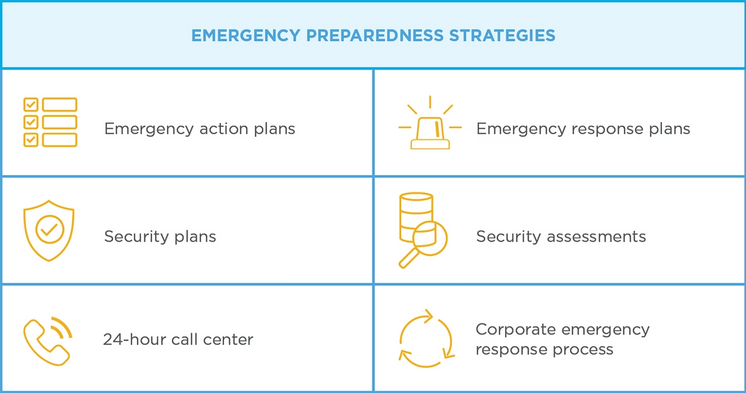

Emergency Preparedness
We equip our operations to provide a robust response both internally and within our local communities in emergency situations. We maintain detailed business continuity plans designed to protect our personnel, facilities, neighbors and the environment and continue critical business functions during sustained events. The Emergency Preparedness and Community Awareness element of our Responsible Operations Management System (ROMS) provides tailored response plans to local operating conditions.
We’re an industry leader in emergency response preparedness. Marathon Oil’s emergency preparedness capabilities include:
- Tier 3: Approximately 75 people worldwide trained on our corporate Centralized Emergency Response Team (CERT), which includes an emergency strike team and an emergency support group. CERT led Marathon Oil’s pandemic response.
- Tier 2: Approximately 150 field- and Houston-based people trained in Federal Emergency Management Agency (FEMA) Incident Command System (ICS)-200 level, ICS specific training and emergency response. These teams are prepared to handle serious incidents.
- Tier 1: Approximately 175 people trained in basic ICS and emergency response at our locations. These response teams, as well as pre-staged equipment, are designed to help us get ahead of incidents that can be resolved in a few hours, including minor releases and spills.
- 70 fire wardens in the United States and 80 in Equatorial Guinea (EG).
- A cross-functional and executive-level crisis management team, which completes yearly crisis management training conducted by our corporate security and emergency response manager.
- A Crisis Communications team and crisis response procedures in place.
- A Cyber Security Incident Response Exercise, performed in 2022, which included approximately 15 people from our IT organization and a specific cyber security playbook, all supported by CERT.
- A network of responders and consultants that regularly interfaces with local and regional team members.
Incident Management Planning and Training
Our emergency preparedness strategies include all-hazard Emergency Action Plans designed for office use in each of our operational locations. These plans include Emergency Response Plans designed to address security threats; spills, fires and water releases; natural disasters, including earthquakes and terrorism; and occupational hazards, such as illness or injury.
Our Corporate Emergency Response Process, a part of ROMS, is consistent with standard industry incident response protocols and is reviewed and updated on a prescribed frequency. We follow the FEMA National Incident Management System (NIMS) and use both in-house and NIMS training. We use the U.S. Department of Homeland Security’s Security Exercise and Evaluation Program to facilitate our exercises. We internally audit our emergency action plans on a set schedule.
We conduct training, drills and exercises for all levels of response teams at least annually, along with government agencies and key stakeholders. In 2022, we conducted eight Tier 1 trainings in the Eagle Ford and six in the Permian and conduct multiple Tier 2 trainings each year. We typically conduct one Tier 3 training annually. As an example, in 2022 we conducted a Tier 2 training in Equatorial Guinea (EG) that included employees, contractors, the EG Navy and EG’s Minister of Mines and Hydrocarbons.
We have set up a comprehensive emergency response communication network to deploy time-sensitive information to employees and contractors quickly and effectively. This network includes email, our intranet, internal communication channels and a virtual command post. Our 24-hour call center connects Houston to all our business offices and emergency response teams.
Each of our CERT members is required to receive NIMS and FEMA-100 response team training. Our emergency response leadership team also holds numerous certifications, including FEMA Certified ICS Instructor, FEMA Emergency Coordinator, U.S. Coast Guard ICS Certification and OSHA HAZMAT. We are active participants in the Cybersecurity & Infrastructure Security Agency (CISA), the Designated Domestic Security Alliance (DISA), API’s emergency response committee, the Energy Security Council and the Overseas Security Advisory Council (OSAC).

How are we doing?
Your opinion matters. Please take a moment to let us know how useful you find the content on this page.
If you’d like to give us your feedback on the entire report, please fill out the complete survey for the 2022 report.



















